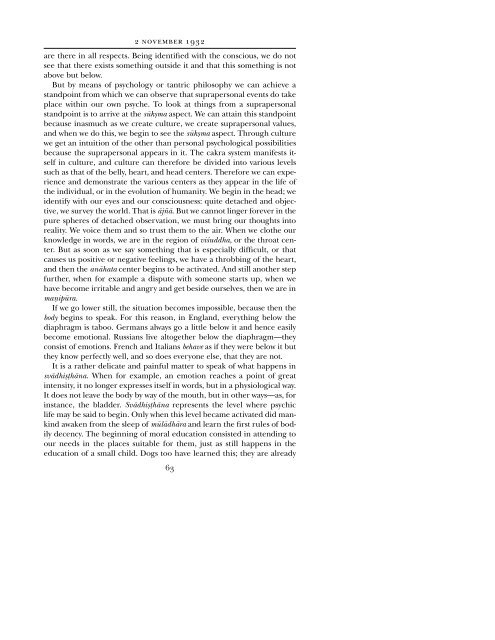CG JUNG - Countryside Anarchist
CG JUNG - Countryside Anarchist
CG JUNG - Countryside Anarchist
You also want an ePaper? Increase the reach of your titles
YUMPU automatically turns print PDFs into web optimized ePapers that Google loves.
2 NOVEMBER 1932<br />
are there in all respects. Being identified with the conscious, we do not<br />
see that there exists something outside it and that this something is not<br />
above but below.<br />
But by means of psychology or tantric philosophy we can achieve a<br />
standpoint from which we can observe that suprapersonal events do take<br />
place within our own psyche. To look at things from a suprapersonal<br />
standpoint is to arrive at the sÖküma aspect. We can attain this standpoint<br />
because inasmuch as we create culture, we create suprapersonal values,<br />
and when we do this, we begin to see the sÖküma aspect. Through culture<br />
we get an intuition of the other than personal psychological possibilities<br />
because the suprapersonal appears in it. The cakra system manifests itself<br />
in culture, and culture can therefore be divided into various levels<br />
such as that of the belly, heart, and head centers. Therefore we can experience<br />
and demonstrate the various centers as they appear in the life of<br />
the individual, or in the evolution of humanity. We begin in the head; we<br />
identify with our eyes and our consciousness: quite detached and objective,<br />
we survey the world. That is vjñv. But we cannot linger forever in the<br />
pure spheres of detached observation, we must bring our thoughts into<br />
reality. We voice them and so trust them to the air. When we clothe our<br />
knowledge in words, we are in the region of viçuddha, or the throat center.<br />
But as soon as we say something that is especially difficult, or that<br />
causes us positive or negative feelings, we have a throbbing of the heart,<br />
andthentheanvhata center begins to be activated. And still another step<br />
further, when for example a dispute with someone starts up, when we<br />
have become irritable and angry and get beside ourselves, then we are in<br />
maõipÖra.<br />
If we go lower still, the situation becomes impossible, because then the<br />
body begins to speak. For this reason, in England, everything below the<br />
diaphragm is taboo. Germans always go a little below it and hence easily<br />
become emotional. Russians live altogether below the diaphragm—they<br />
consist of emotions. French and Italians behave as if they were below it but<br />
they know perfectly well, and so does everyone else, that they are not.<br />
It is a rather delicate and painful matter to speak of what happens in<br />
svvdhiü°hvna. When for example, an emotion reaches a point of great<br />
intensity, it no longer expresses itself in words, but in a physiological way.<br />
It does not leave the body by way of the mouth, but in other ways—as, for<br />
instance, the bladder. Svvdhiü°hvna represents the level where psychic<br />
life may be said to begin. Only when this level became activated did mankind<br />
awaken from the sleep of mÖlvdhvra and learn the first rules of bodily<br />
decency. The beginning of moral education consisted in attending to<br />
our needs in the places suitable for them, just as still happens in the<br />
education of a small child. Dogs too have learned this; they are already<br />
63


